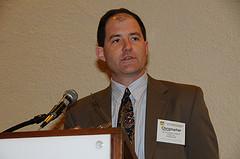At the U.S. Grains Council’s 7th International Marketing Conference, Christopher Langholz, president of Cargill AgHorizons, told an audience of nearly 200 attendees of the Council’s significant role in expanding trade opportunities for U.S. farmers.
Acknowledging the ongoing balancing act between managing supply and demand, he emphasized the need to focus on promoting demand creation to unlock the full potential of the U.S. ag supply chain. “The last 10 percent of demand sold effectively determines the price on 100 percent of supply. If the 1.3 billion bushel corn carry out of 2008 would have been 500 million bushels higher or lower, it would have had a significant effect on the price,” Langholz said, adding that the role of exports is critical. “Exports are a way to get us those extra, critical cents per bushel,” he said. “We want demand that we can see coming — and be able to produce for it.”
Langholz discussed five tangible ways to increase U.S. corn exports:
• Active Trade Policy Agenda. Langholz said that approvals on pending free trade agreements are fundamental to expanding U.S. ag exports. “Market access and free trade are priorities for Cargill and, by extension, for our customers. We want to see the passage of pending trade agreements, and the removal of existing trade barriers,” he said.
• Re-investment in U.S. Export Infrastructure. “The United States has a competitive advantage with the farm-to-market river system,” said Langholz. “We need to invest in our U.S. inland waterways. Keeping that system well-functioning and efficient is key for long-term success.”
• Champion Greater Use of Biotechnology. “We continue making inroads on acceptance of biotechnology, but still face many challenges. Ag biotechnology is thoroughly researched and regulated … we see it as a powerful tool that may help raise living standards around the world. Modern-day biotechnology practices make it possible to maximize crop yields and grow crops in areas of the world that were never before possible,” he said. “Ultimately, we must respect consumer choice by serving the needs of our food and feed manufacturing customers with the full range of grains and oilseeds on the market today.”
• Adaptability and Capability of U.S. Supply System. Langholz said the United States has significant market advantage due to unparalleled capabilities such as combination vessels, fast loading, credible governmental inspection service and flexibility in standardized contract terms. “Our system can accommodate specific customer needs better than our competitors. Having a system that can separate things out to customer specifications gives us a greater opportunity to influence purchasers,” he said.
• Basic Market Development in the Right Sectors. Langholz said, “This is what the Council does best. Do more of what you’re doing.”
“This is not a theoretical exercise,” he concluded. “No other country in the world has the infrastructure and production capabilities of the United States … we need to increase exports as much as possible. Cargill believes in the mission of the Council and, as a charter member, has witnessed its successes over the past 50 years. We look forward to the next 50 years.”


